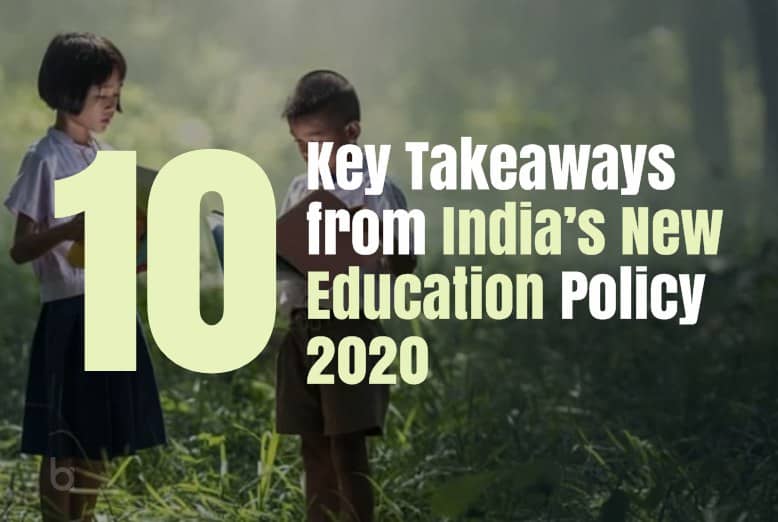India’s Union Cabinet on Wednesday, July 29th, announced the new National Education Policy 2020 (NEP). The policy is expected to set the roadmap for the education sector keeping in mind the present employment scenario in the country. It also emphasizes on non-academic skills and increased inclusion through language diversity and course fluidity. This is India’s third NEP–the earlier ones came in 1968 and 1986. The cabinet also decided to rename the Ministry of Human Resource Development as the Ministry of Education.
Some of the major amendments of the policy include the wholesale restructuring of higher education into three categories of institutions, discontinuation of MPhil courses, and a plan to increase public spending on education to nearly 6 percent of the GDP. The policy was developed after nearly five years of consultations with stakeholders and general public. The draft was prepared by a panel, headed by former Indian Space Research Organization (ISRO) chief Dr. K. Kasturirangan and was submitted to the Human Union Research Development Ministry.
Here are some of the highlights and the key takeaways from India’s New National Education Policy 2020.
Easy Entry at all Levels of School Education
The NEP 2020 focuses on universal access to school education at all levels–preschool to secondary. To achieve this, provisions such as infrastructure support, innovative education centers to bring back dropouts into the mainstream, tracking of students and their learning levels, and several others are included in the NEP. The policy also facilitates multiple pathways to learning that involves both formal and non-formal education modes. Vocational courses, adult literacy, and life enrichment programs are some of the other provisions of the policy.
Early Childhood Care and Education
The traditional 10+2 structure of the school education will be replaced by a new 5+3+3+4 curricular structure, which will correspond to ages 3-8, 8-11, 11-14, and 14-18 years respectively. This move will introduce the early age group of 3-6 years with the school curriculum as this age is recognized globally as a crucial stage for the development of a child’s mind. The NCERT will also develop a National Curricular and Pedagogical Framework for Early Childhood Care and Education (NCPFECCE) for children under the age of 8.
Foundational Literacy and Numeracy
The HRD Ministry will set up a national mission on Foundation Literacy and Numeracy. The states will prepare an implementation plan for attaining universal foundational literacy and numeracy in all primary schools for all learners by grade 3 by 2025.
Emphasis on Mother Tongue
The policy has emphasized the use of regional/local languages as the medium of instruction at least till Grade 5. Furthermore, Sanskrit will be offered at all levels of school and higher education as an option for students.
Fair and Inclusive Education
The policy aims to ensure the children’s rights to education are preserved. For this, it has provided the Gender Inclusion Fund and also Special Education Zones for the disadvantaged and unnoticed regions and groups. Moreover, children with disabilities will also be enabled to fully participate in regular schooling processes.
Improving the Gross Enrollment Ratio (GER)
NEP 2020 plans to increase the Gross Enrollment Ratio (GER) in higher education including vocational education, from 26.3 per cent in 2018 to 50 per cent by 2035. For this, approximately 3.5 crore new seats will be added to higher education institutions.
Financial Support for the Students
Through this policy, efforts will be made to incentivize the merit of students belonging to SC, ST, OBC, and other SEDGs. The National Scholarship Portal will be expanded to foster, support, and track the progress of students receiving scholarships. Moreover, private higher education institutes will also be encouraged to offer a large number of scholarships to their students.
Online and Digital Education
A dedicated unit will be created in the HRD ministry for the digital infrastructure building, digital content, and capacity building. The unit will complement the digital learning needs of both school as well as higher education.
Promotion of the Indian Languages
The New Education Policy has recommended setting an Indian Institute of Translation and Interpretation, and National Institute for Pali, Persian, and Prakrit. The policy also emphasizes on strengthening of Sanskrit and all language departments in the higher educational institutes, and the use of local language as a medium of instruction in higher education programs. Through this, the policy aims to ensure the preservation, growth, and vitality of Indian languages.
Leveraging Technology in Education
The National Educational Technology Forum (NETF) will be created to provide a platform for the exchange of ideas on the use of technology to enhance learning, assessment, planning, and administration. It will also improve classroom processes, support teacher professional development, enhance educational access for the disadvantaged group, and streamline education management. Moreover, appropriate integration of technology into all levels of education will be done.
Also read: Indian Automobile sector welcomes Vehicle Scrappage Policy 2021-22




















